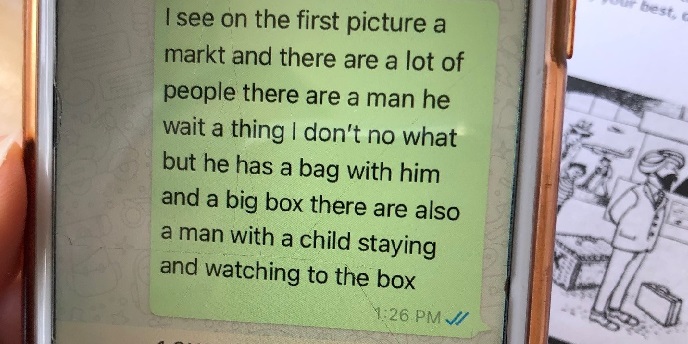Van vluchteling tot student
Jonge vluchtelingen die naar Nederland komen, begrijpen dat de route naar een nieuwe toekomst via het onderwijs loopt. Daarbij staat Nederlands leren vaak centraal, maar wordt er ook aandacht besteed aan het Engels. Bij het Alfa-college in Groningen kan deze groep zich in een schakeljaar voorbereiden op een vervolgstudie in het MBO, HBO of de universiteit. Hun docenten zijn voortdurend op zoek naar nieuwe inzichten en methoden om deze specifieke groep zo goed mogelijk te begeleiden. Letterenstudenten Evgenia Korvesi en Elise Knibbe deden onder begeleiding van Marije Michel daarom onderzoek naar de taalverwerving van jonge vluchtelingen in deze setting.
Tegelijk Nederlands en Engels leren, hoe bevalt dat?
Vanuit het idee dat studenten het Staatexamen Nederlands moeten behalen om toegelaten te kunnen worden tot een vervolgopleiding, wordt door het Alfa-college veel tijd en aandacht besteed aan het Nederlands. De laatste jaren is het hoger onderwijs in Nederland echter steeds internationaler geworden, wat tot gevolg heeft dat veel studies in het Engels worden aangeboden. Daarnaast moeten ook studenten in Nederlandstalige opleidingen vaak Engelstalige artikelen en tekstboeken bestuderen. Daarom is het belangrijk dat de aankomende studenten die in het hoger onderwijs in willen stromen, ook het Engels goed onder de knie krijgen.
Voor haar bachelorscriptie Europese Talen en Culturen deed Elise Knibbe onderzoek naar hoe deze groep het ervaart om tegelijk Nederlands en Engels te leren. Met behulp van interviews in kleine groepen, focust het onderzoek zich specifiek op de perspectieven van de studenten zelf. Een van de meest opvallende resultaten is, dat veel studenten aangeven dat hun Engels achteruitging door een te sterke focus op het Nederlands. Toch zijn ze gemotiveerd om beide talen te leren en hebben ze ondanks aanmerkelijke post-migratie stress veel doorzettingsvermogen en discipline om te slagen. Elise kwam op grond van deze gesprekken tot aanbevelingen voor het onderwijs. Ze geeft duidelijk aan hoe je de verbinding tussen de lessen Nederlands en Engels kunt versterken en hoe je de aandacht voor beide talen meer in balans kunt brengen.

Beter Engels spreken door met elkaar te chatten
De groep vluchtelingen die in wil stromen in het Nederlandse MBO heeft daarvoor ook Engels nodig. Hun docenten gaven aan dat vooral Engels spreken voor velen van hen een struikelblok is. Hoe zou je de spreekvaardigheid op een structurele en laagdrempelige manier kunnen verbeteren? Voor haar masterscriptie Toegepaste Taalkunde bood de Griekse Evgenia Korvesi de helpende hand met op maat gemaakt lesmateriaal en een inventieve methode. Stap voor stap gingen de leerlingen bezig met het navertellen van een verhaal in het Engels. Daarbij kregen ze woordenschat en grammaticale structuren aangeboden en chatten ze via WhatsApp met elkaar in verschillende oefeningen. De stap-voor-stap opbouw leidde tot een spreekopdracht aan het einde. Evgenia onderzocht de effecten van deze aanpak nauwkeurig door de resultaten te verzamelen en te analyseren en ook met de docenten en leerlingen te praten over hoe ze het hadden ervaren. Het bleek een succesvolle aanpak, de leerlingen vonden het leuk en gingen vooruit. Het op deze manier met elkaar chatten bleek uiteindelijk te helpen om vlotter, begrijpelijker en met minder fouten Engels te spreken. Het onderzoek van Evgenia was zo goed, dat ze samen met haar scriptiebegeleider Marije Michel een wetenschappelijk artikel erover gaat schrijven!
